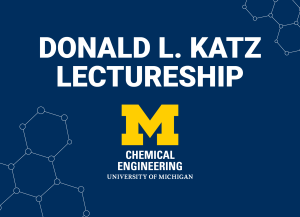Presented By: Chemical Engineering
2025 Donald L. Katz Lectureship in Chemical Engineering
with David A. Weitz, Harvard University

This is a closed event for members of the Michigan Chemical Engineering Community only.
The lectureship is named in honor of the late Donald L. Katz who was a Professor of Chemical Engineering at the University of Michigan for many years. Dr. Katz was an inspiring teacher, outstanding leader and imaginative investigator in the field of Chemical Engineering and Petroleum Technology.
This event is open to all U-M faculty, students and staff.
Seminar Abstract: "Drop-based microfluidics: Biology a picoliter at a time"
This talk will describe the use of drop-based microfluidics for biological and biotechnological applications. By creating micron-scale drops using microfluidic techniques, fluid volumes between nanoliters and picoliters can be emulsified within the drops in a non-interacting fluid. These can be used to template structures that can be used for encapsulation and release for applications such as drug delivery and cosmetics. They can also be used to develop very high throughput screening for a myriad of biotechnological applications.
About David Weitz:
David A. Weitz is the Mallinckrodt Professor of Physics and Applied Physics at Harvard University, where he has established a renowned career in the field of soft condensed matter physics and microfluidics. He earned his Ph.D. in physics at Harvard in 1978 under the mentorship of Prof. M. Tinkham. Before joining Harvard, Weitz was a professor at the University of Pennsylvania and a physicist at Exxon Research and Engineering Co. His research contributions, such as developing Diffusing-Wave Spectroscopy and pioneering work in microrheology, have significantly advanced the understanding of complex fluids and soft materials.
Weitz's lab at Harvard is at the forefront of studying the physics of soft condensed matter, which includes work on colloidal dispersions, foams, and emulsions. The lab is also dedicated to advancing microfluidic techniques for the synthesis of new materials and complex biochemical assays. The team explores the mechanics of biomaterials and cell rheology, striving to innovate in the fields of encapsulation and fluid dynamics.
Weitz's prolific academic and scientific contributions have been recognized by his election to several prestigious organizations. He is a member of the National Academy of Sciences and the National Academy of Engineering, as well as a foreign member of the Chinese Academy of Chemistry. Additionally, he is a fellow of the Royal Society of Chemistry and the American Physical Society, and a member of the American Academy of Arts and Sciences. Beyond his research and teaching, Weitz has served on numerous scientific advisory boards, including as chair of the Gordon Research Conference Board of Trustees since 2019, with his tenure extending as chair in 2025. His distinguished career includes numerous awards, such as the 2024 Bower Award and Prize for Achievement in Science from The Franklin Institute and recognition as a Clarivate Analytics Highly Cited Researcher from 2018 to 2023. Weitz has published over 868 papers, led the founding of more than 20 startups, and created popular courses at Harvard, such as "Science and Cooking," which has attracted more than five million video views.
The lectureship is named in honor of the late Donald L. Katz who was a Professor of Chemical Engineering at the University of Michigan for many years. Dr. Katz was an inspiring teacher, outstanding leader and imaginative investigator in the field of Chemical Engineering and Petroleum Technology.
This event is open to all U-M faculty, students and staff.
Seminar Abstract: "Drop-based microfluidics: Biology a picoliter at a time"
This talk will describe the use of drop-based microfluidics for biological and biotechnological applications. By creating micron-scale drops using microfluidic techniques, fluid volumes between nanoliters and picoliters can be emulsified within the drops in a non-interacting fluid. These can be used to template structures that can be used for encapsulation and release for applications such as drug delivery and cosmetics. They can also be used to develop very high throughput screening for a myriad of biotechnological applications.
About David Weitz:
David A. Weitz is the Mallinckrodt Professor of Physics and Applied Physics at Harvard University, where he has established a renowned career in the field of soft condensed matter physics and microfluidics. He earned his Ph.D. in physics at Harvard in 1978 under the mentorship of Prof. M. Tinkham. Before joining Harvard, Weitz was a professor at the University of Pennsylvania and a physicist at Exxon Research and Engineering Co. His research contributions, such as developing Diffusing-Wave Spectroscopy and pioneering work in microrheology, have significantly advanced the understanding of complex fluids and soft materials.
Weitz's lab at Harvard is at the forefront of studying the physics of soft condensed matter, which includes work on colloidal dispersions, foams, and emulsions. The lab is also dedicated to advancing microfluidic techniques for the synthesis of new materials and complex biochemical assays. The team explores the mechanics of biomaterials and cell rheology, striving to innovate in the fields of encapsulation and fluid dynamics.
Weitz's prolific academic and scientific contributions have been recognized by his election to several prestigious organizations. He is a member of the National Academy of Sciences and the National Academy of Engineering, as well as a foreign member of the Chinese Academy of Chemistry. Additionally, he is a fellow of the Royal Society of Chemistry and the American Physical Society, and a member of the American Academy of Arts and Sciences. Beyond his research and teaching, Weitz has served on numerous scientific advisory boards, including as chair of the Gordon Research Conference Board of Trustees since 2019, with his tenure extending as chair in 2025. His distinguished career includes numerous awards, such as the 2024 Bower Award and Prize for Achievement in Science from The Franklin Institute and recognition as a Clarivate Analytics Highly Cited Researcher from 2018 to 2023. Weitz has published over 868 papers, led the founding of more than 20 startups, and created popular courses at Harvard, such as "Science and Cooking," which has attracted more than five million video views.